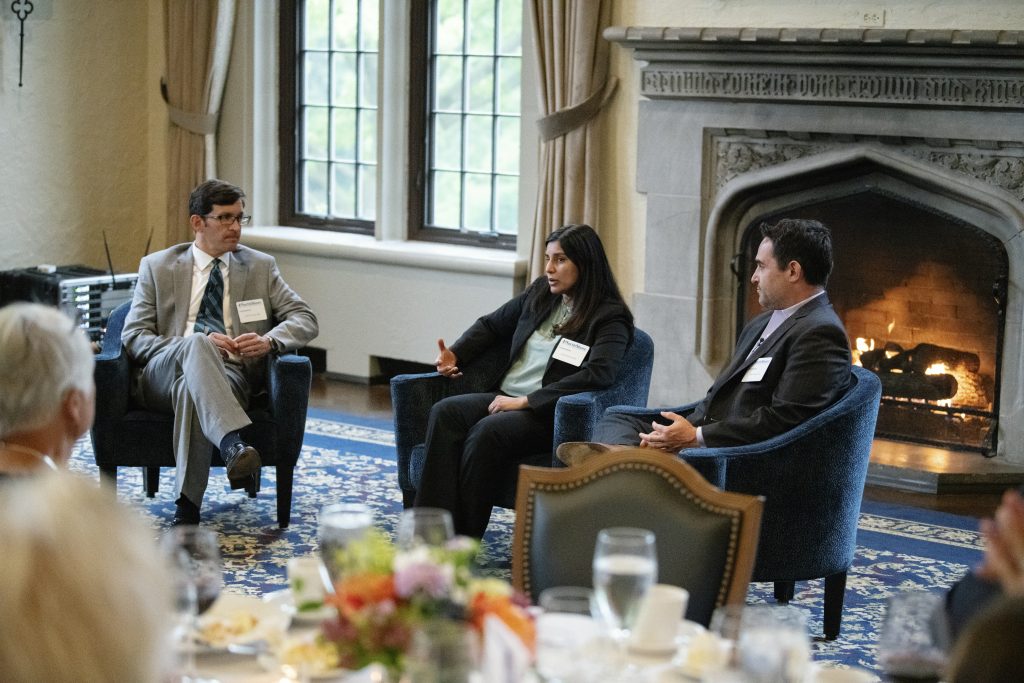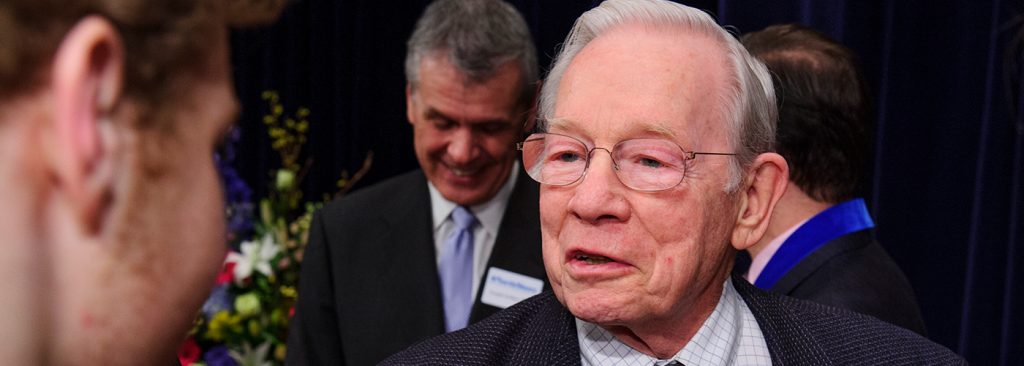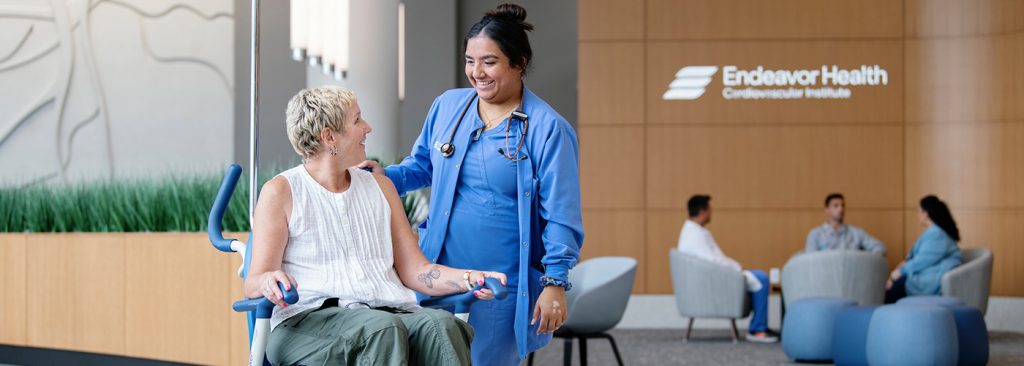By Hyde Russell, MD, the Owen L. Coon Chair of Cardiothoracic Surgery and Co-Director of the NorthShore Cardiovascular Institute
In the past 10 years, much has changed in how we treat heart failure at NorthShore University HealthSystem (NorthShore).
For instance, when I started working here in 2015, we didn’t have a physician leader in heart failure, nor did we have as many capabilities in electrophysiology. But today, NorthShore has become cutting-edge in its approach to heart health, and I am very proud of what we’re able to do. We’re providing exceptional cardiac care at all of our NorthShore hospitals and vastly improving how we treat heart failure.
In conjunction with the NorthShore Foundation, we recently held a special 1891 Society Dinner discussion about treating heart conditions. This annual program is hosted by 1891 Society members and the Planned Giving Advisory Council. It’s thanks to NorthShore leadership and the private philanthropy investments of 1891 Society members and many others that building new programs and recruiting skilled physicians is possible. With this support, we’ve been able to greatly improve patient outcomes and provide care for heart patients.
Looking to the future, the new NorthShore Cardiovascular Institute (CVI) pavilion, currently under construction at NorthShore Glenbrook Hospital, is a physical manifestation of where we’re headed. While we look to the future, there’s still a lot of amazing work and progress being made right now in how we diagnose, study and treat conditions of the heart.
Treating heart conditions at NorthShore
Heart failure is a condition caused by blockage that often involves the heart valves and electrical problems—and in some instances, it’s an issue with the heart muscle itself. It’s a condition affecting more and more patients. Today, our highly specialized physicians provide care for complex heart conditions or heart failure for patients we previously transferred to other hospitals.
Joining me for the recent 1891 Society Dinner discussion was Nitasha Sarswat, MD, and Mark Metzl, MD, both of whom are cardiologists who work collaboratively with other physicians across NorthShore to address issues involving heart failure and to explore treatment options.
Dr. Sarswat’s area of expertise is heart failure, which she pointed out has a negative connotation because of the term failure. The reality is that many people with heart failure can live long and healthy lives if it’s caught early on. There are more medicines and devices available to treat heart failure than ever before, which gives our patients more time with their families. For that reason, Dr. Sarswat prefers to call it heart success.
Dr. Metzl specializes in cardiac electrophysiology, which is one of the most exciting areas of cardiac care. It is extremely tech-based, and those technological advancements allow us to treat heart rhythm abnormalities such as atrial fibrillation (AFib) in ways that were not possible previously. AFib is common in heart failure or stands alone and requires additional treatment with blood thinners to prevent stroke. For some patients, blood thinner medications are not an option due to bleeding-related issues—and for these patients, we can implant a device that prevents the buildup of AFib-related clots. The most commonly used device is the WATCHMAN, which is implanted in the left atrial appendage where most of these clots form. We began this program in 2016, but it has really been accelerating since 2019 with a total now of over 320 device implants.
Just in 2023, we’ve seen a 30% growth in procedures, likely due to increased recognition of AFib and patient-related blood thinning issues that mandate this alternative approach. In today’s world, the procedure takes only a few hours, and we’re looking at performing it with only moderate sedation, with the patient generally going home the same day.
Understanding heart conditions
While treating heart failure and AFib is important, it’s also critical that we work to understand how these conditions affect each patient differently. Physician-researchers at the NorthShore Cardiovascular Institute are conducting studies to that effect, and both Dr. Sarswat and Dr. Metzl shared how they’re continually learning about how to best treat heart conditions.
For example, Dr. Sarswat is conducting research to understand how we can tailor the treatment of heart failure to meet the unique needs of each individual patient. A person’s genetic background might put them at a different disposition for heart failure, so it’s not a one-size-fits-all approach to treatment. Using genetic testing for a personalized approach to heart failure wasn’t possible 10 years ago, but today at NorthShore, genetic tests are increasingly common.
Dr. Sarswat’s research also involves testing new medications to reverse the effects of heart disease and give patients a longer, better quality of life. If she’s successful, this important research will push the medical field into the future thanks in part to patient participation in clinical trials and working with physician-colleagues to understand this condition better.
Because AFib is such a complicated disease, putting patients at a higher risk of stroke, Dr. Metzl started an AFib clinic at NorthShore. One goal of the clinic is to look at the whole patient, taking into consideration their lifestyle and what can be done without medication to improve the condition.
During our panel discussion, Dr. Metzl shared that the future is exciting for the field of electrophysiology. NorthShore has a strong collaborative culture among physicians, and that has only served to help our patients. Today, electrophysiology is better utilized as an option for patient care as well as for patients with AFib.
Where is NorthShore taking heart health in the future?
The ability to provide exceptional cardiac care relies on cutting-edge clinical trials. The new NorthShore CVI pavilion will be our specialty heart hospital, allowing us to both conduct research and provide patient care in the same location.
NorthShore Glenbrook Hospital was selected as the site for the CVI pavilion because the Glenbrook campus offers ample space, and its location will significantly expand access to specialty cardiac care regionally. What’s reassuring to our patients is that routine heart services will still be offered in all our NorthShore hospitals. The CVI pavilion’s services, as part of a holistic approach to healthcare, will increase the level of cardiac care on Chicago’s North Side and throughout the state.
Dr. Metzl shared that he’s excited about the new CVI pavilion because physicians, nurses and other caregivers participated in the building design, and it’s being built with future technology in mind. Additionally, the new space will bring together different cardiology specialists to work collaboratively in one hospital rather than at many different sites.
Dr. Sarswat echoed this sentiment of excitement for collaboration at the CVI pavilion, which will enhance how we treat patients individually with their own personalized approach in mind. The CVI pavilion will become a one-stop destination for patients with complex heart conditions, where cardiologists can work together as a team with their colleagues who are experts in other areas.
It’s incredible to see how far we’ve come in just 10 years with regard to heart failure and other heart conditions. NorthShore is poised to take cardiology care to the next level by creating an environment where multidisciplinary teams continue to move the field into the future. It will be exciting to see where we are 10 years from now and to see how much more we’ve accomplished to the benefit of our patients and our communities.
We’re taking a bold step forward in cardiovascular care for our patients, for their families, for our caregivers and for the future. Join us on this journey!
Masthead Photo (left to right): Hyde Russell, MD, Nitasha Sarswat, MD, and Mark Metzl, MD
Photo Credit: Jon Hillenbrand




